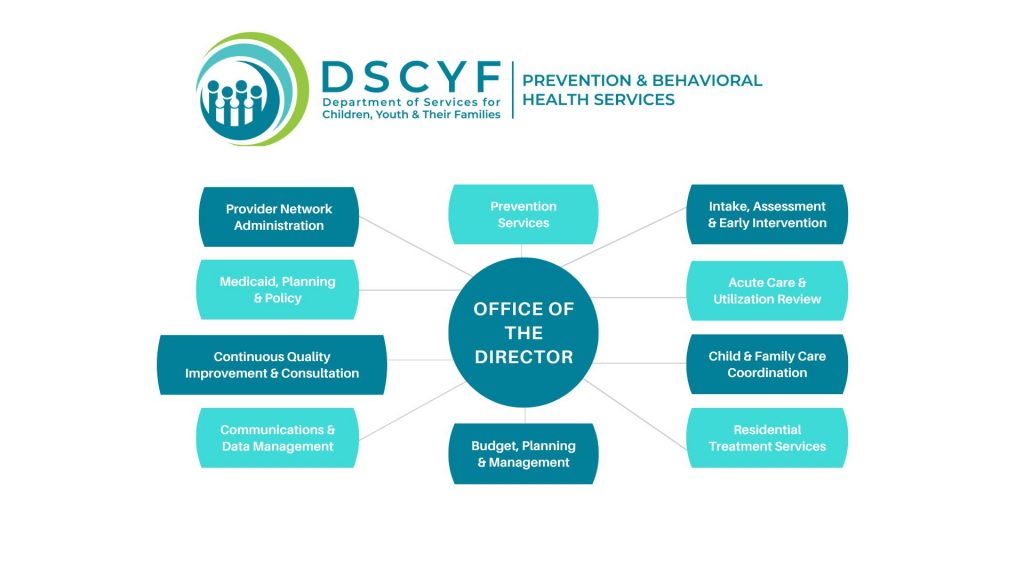
Our division develops, maintains and supports a system of high quality, accessible behavioral health, prevention, early intervention and treatment services to assure that children and families are served within a coordinated system of care.
The Division is organized into the following components under the Office of the Director:


The Division is a nationally accredited organization which must adhere to regulated standards. In addition, all DPBHS providers are expected to adhere to these standards.
The CARF (Commission of Accreditation of Rehabilitation Facilities) accreditation process provides for continuous quality improvement opportunities for the Division and its providers.
DPBHS had their most recent CARF review in 2022 and received the maximum certification period of 3 years.
2023-2025 Strategic Plan Goals and Objectives
We are pleased to share a copy of our recently completed needs assessment for the children’s behavioral health prevention, early intervention, and treatment system. DPBHS contracted with Health Management Resources (HMA) to assess our system to identify gaps and needs related to substance use and co-occurring services for Delaware children and their families. Key findings from the report included expansion of substance use screening using validated approaches, improving the collection and use of data to track outcomes, targeted prevention efforts for use of marijuana, workforce development to increase access to substance use and co-occurring intensive behavioral health treatment and improved communication to consumers and other stakeholders regarding access to the continuum of behavioral health treatment delivered by the Medicaid MCO’s and DPBHS.
DPBHS Substance Use Treatment System Report
Other appendices were lengthy reports in the public domain for which there are links below. A few appendices, related to the raw data for interviews and surveys, are not being shared as doing so might compromise the confidentiality of our respondents.
Links to appendices:
Appendix 3 Youth and Young Adult Substance Use Prevention (Oregon) https://www.oregon.gov/oha/HSD/BH-Child-Family/Documents/Youth-Young-Adult-SUD-Treatment-Recovery-Report-EN.pdf
Appendix 12 Truth Initiative Ending Big Tobacco’s Influence https://truthinitiative.org/sites/default/files/media/files/2023/09/Truth_Annual%20Report%202022_final_web2.pdf
Appendix 13 Blueprint for Transformation (Illinois) https://www2.illinois.gov/sites/gov/Documents/childrens-health-web-021523.pdf
Appendix 14 Implementation Feasibility and Hidden Costs https://pubmed.ncbi.nlm.nih.gov/38268465/
Appendix 15 Protecting Youth Mental Health (US Surgeon General) https://pubmed.ncbi.nlm.nih.gov/34982518/
Appendix 16 ASAM Criteria Assessment Interview Guide https://www.asam.org/asam-criteria/implementation-tools/criteria-intake-assessment-form
Appendix 17 Connecticut Children’s Behavioral Health Plan https://www.plan4children.org/wp-content/uploads/2022/02/Screening-and-tool-final-5-6-19.pdf
If a child is experiencing a behavioral health crisis, call our 24/7 Mobile Response Stabilization Services hotline 1-800-969-HELP (4357).
To learn about free prevention services for substance misuse, trauma, mental health, stress relief, healthy relationships, caregiver support and more, call 302-633-2680, Monday – Friday 8:00 a.m. – 4:30 p.m. or e-mail PBHS_Prevention_Inquiries@delaware.gov. The division also offers free prevention focused materials to the public. To request materials, please visit the Prevention Resource Center.
For information on additional services, please call the DPBHS Information and Referral Unit weekdays from 8:00 a.m. to 4:30 p.m. at 302-633-2571 or 1-800-722-7710 or email at: DSCYF_Intake_General@delaware.gov
If you have a question, concern or complaint related to the Division, our services, staff or policies please email it to our Constituent Concerns Liaison, Janet.Taylor@delaware.gov.
For unit specific inquiries, please visit the DPBHS Contact Us page.